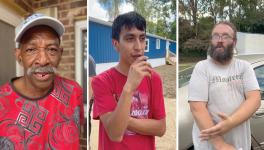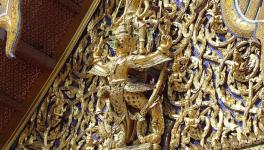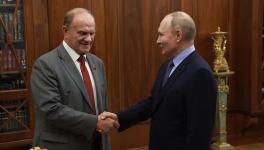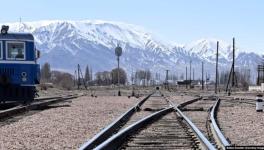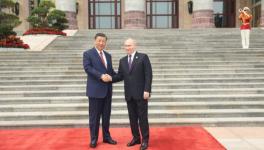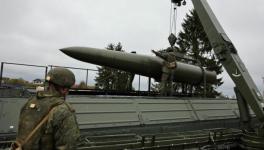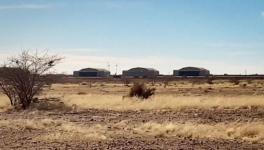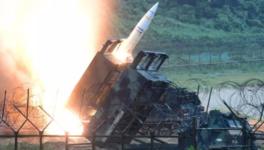The Bloody Siege of Mosul
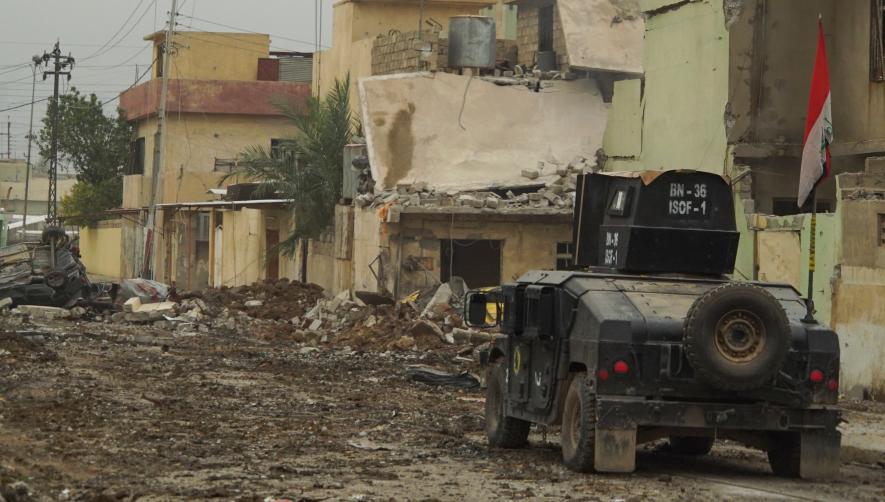
Attack on Mosul, Image Courtesy: wikipedia.org
The international focus is mainly on Syria following the American cruise missile attack on the country. The western media is full of stories about the alleged atrocities being committed by the Syrian government. The world's attention has been successfully deflected from the crimes being committed in Iraq by the United States in neighbouring Iraq as it struggles to subdue the Daesh (Islamic State) in Mosul. The Iraqi military backed by the full power of the American air force and allied militias, is still struggling to completely liberate Iraq's second biggest city. Iraqi forces have had to fight block by block to liberate eastern Mosul in the face of fierce resistance and hordes of suicide bombers. The more thickly populated western part is still being held by the Daesh even after the American air force started carpet bombing the city for months. Mosul, as well as Raqqa, the “capital” of the so-called Islamic State, will no doubt be liberated very soon, but it will be at great human cost, dwarfing the scale of bloodshed witnessed in the liberation of Aleppo.
A blockade on the city of over 1.8 million citizens was imposed three months before the full scale military assault on Mosul began in October last year. Food, medicines and other essentials have all but disappeared from the besieged city. According to human rights groups more than 2400 civilians have been killed as a result of strikes by the American led military coalition in the month of March itself. Between August 2014 and February 2017, the United States had admitted to carrying out 18,645 air strikes against Daesh targets in Iraq and Syria. The Daesh is of course happy that American strikes kill more civilians than their fighters. It only buttresses the Daesh propaganda that America cares little for Muslim lives.
The aerial attacks had further intensified after President Donald Trump assumed office. On the campaign trail, he had promised to indiscriminately use American fire power in Iraq and Syria. As president, he had once said that he would just bomb Iraq and “take the oil”. According to reports in the American media, the use of American air power and targeted killings has escalated since Trump took over the presidency. During the previous Obama presidency too, American war planes and special forces were active over Iraq, Syria, Yemen and Afghanistan. Drone and missile attacks during the Obama years had registered an alarming increase also but the former president at least used to personally sanction the targeting of high value and sensitive targets. Since Trump took over, there already have been more air strikes in Yemen than in the whole of last year. Military commanders on the ground have been given powers by the Trump administration to order major air strikes.
Recent attacks that have been blamed on the Americans have led to the loss of thousands of civilian lives in the Iraq/Syria theater. As a result of the intensive fighting and increased assaults from the air, hundreds of bodies are said to be buried under the rubble in Mosul. The Iraqi forces directly involved in the fighting call for American air support to advance in the fiercely contested city. With the Daesh fighters ensconced in the densely populated urban settlements and willing to fight to the death, the progress of the Iraqi army has been slow despite the use of American firepower to reduce entire neighbourhoods to rubble.
In the month of March, two attacks, one on a mosque in Syria and the second in eastern Mosul, have been blamed on the American forces. The air strike on a residential complex on March 17 killed more than 200 people, according to eyewitnesses on the ground in Mosul. The Pentagon had initially denied any involvement in the attack but given the evidence, it has now reluctantly ordered a probe into the circumstances leading to the aerial strike. Lt. Gen. Peter Townsend, the US military commander in Iraq conceded that the Americans “probably had a role” in the incident. He said that the American military had returned to “its standard military doctrine” in the region in contrast to the very “centralised approach” that the previous Obama administration had adopted. The American military under the Trump administration wants to fast track the liberation of Mosul and declare victory over the Daesh. Evidently it does not matter much, if the ancient city of Mosul is reduced to rubble. Already the depredations of the Daesh have wrought immeasurable havoc to the cultural fabric of the city. Priceless ancient artifacts were among the historical objects that the Daesh had destroyed.
The Iraqi general in command of the Mosul offensive, Maj. Gen. Man al-Saadi, has demanded that the US led military coalition should temporarily halt its aerial attacks on Mosul until the results of the inquiry are out. He urged the American military planners to be more cautious while picking targets in the future. Both the Iraqi army as well as the Pentagon are claiming that the Daesh is using civilians as “human shields”. At the same time, the Iraqi army and the government have been telling the residents of Mosul to stay put, pledging that they would not be targeted. Around 400,000 civilians still remain trapped in areas still controlled by the Daesh in Mosul. Many starving and scared citizens had fled from the city at great risk, escaping fire from many directions.
In the case of the latest incident in the Mosul suburb of Jadida, Iraqi forces had reportedly called for American air strikes to take out a few Daesh snipers firing from the rooftops of residential buildings. In other Iraqi cities like Falluja and Ramadi, most of the civilians had fled before the battle for the liberation of the cities began. The US military has also opened investigations into the attack on a mosque in Syria's Aleppo province, which killed more than 50 people. The Pentagon had initially denied that that the American air force was involved in the attack though they admitted that a site adjacent to the mosque, described as a meeting place for Daesh fighters and new recruits, was in fact attacked.
Gen. Joseph Votel, a senior US army officer told the US Congressional Committee in late March, that it would be difficult to “maintain the extra-ordinary high standards” to limit civilian casualties in the narrow, crowded streets of old Mosul. The United Nations High Commissioner for Human Rights, Zeid Ra'ad al-Hussein, has called on the United States to reconsider its tactics in Mosul and the region. Amnesty International pointed out that the United States should have taken into consideration the fact that Iraqi authorities were all the while urging the residents of Mosul to stay indoors instead of fleeing from the areas under siege. American led coalition forces should have known that aerial strikes would cause widespread collateral damage to the civilian populace. Amnesty has described the American bombing of residential areas as “disproportionate and indiscriminate”. The Iraqi vice president, Osama al Nujaifi, who hails from Mosul, called the US bombings a “humanitarian catastrophe” that had resulted in “the martyrdom of hundreds of civilians”. He blamed the deaths on the changed rules of conflict for the American forces authorised by the Trump administration.
The western media has been noticeably silent in its coverage of the ongoing attack on Mosul in comparison with its over the top reportage of the siege of Aleppo. In the lexicon of the western governments and the mainstream media, what is happening in Mosul is “liberation” while the ouster of the jihadist forces from Aleppo was predominantly a “massacre” perpetrated by Syrian forces and its main ally, Russia. President Bashar Assad and Vladimir Putin were painted as the “destroyers” of Aleppo. Many of the rebel fighters in Eastern Aleppo were armed, trained and financed by America, Turkey and the Gulf sheikhdoms. Despite these fighters working hand in glove with jihadi groups like the Jabhat al Nusra and the Daesh, they were hailed as freedom fighters by the West.
For that matter, the Daesh holed up in Mosul and Raqqa also got their initial training and military expertise under American tutelage. The “military surge” of 2006 ordered by the Bush administration in Iraq brought a large number of Sunni fighters and militias into the payroll of the Americans. A senior official in the Trump administration, James Shea, has admitted that many of the Daesh fighters were initially trained by the Americans in the last decade. Most of their sophisticated weaponry is also of American origin with a significant amount captured from the Iraqi army during the capture of Mosul. The Iraqi army, which was armed and trained by the Americans had fled leaving all their arsenal behind. This was immediately put to good use by the Daesh in the military campaign in other parts of Iraq and Syria. Many of the Dash commanders were also senior officers in the Iraqi army under Saddam Hussein.
It was the Americans who encouraged the emergence of the sectarian divide in Iraq and the wider region. The initial impetus to Sunni extremism was given by Washington. Other important developments like the Arab Spring and foolhardy moves by the Gulf emirates to play a big role in the destabilisation of Syria, were factors that led to the dramatic rise of the Daesh and the dissolution, albeit temporary, of the colonial Sykes-Picot boundary that had artificially carved out states in the region.
The inevitable fall of Mosul may not signal the end of the Daesh as a threat. Many military strategists are of the view that the attack on Mosul should have only commenced only after the other areas in northern and western Iraq where the Daesh has considerable support were first pacified. According to reports, many Daesh fighters have already fled from besieged Mosul to these parts to recuperate and fight another day. Though the Daesh may no longer be able to control large swathes of territory or be able to masquerade as an emirate, it will retain the capacity of waging guerrilla warfare and suicide attacks. It could find willing recruits among the displaced Sunni populations that has been uprooted from major Iraqi cities, including Mosul, Ramadi and Kirkuk. They are living in miserable conditions in refugee camps. The displaced people are not allowed to return to their homes in cities like Kirkuk, that have been taken over by the Kurds. The fall of Mosul does not, at least in the short run, herald a reconciliation of hearts and minds in Iraq and the wider region.
Disclaimer: The views expressed here are the author's personal views, and do not necessarilyrepresent the views of Newsclick
Get the latest reports & analysis with people's perspective on Protests, movements & deep analytical videos, discussions of the current affairs in your Telegram app. Subscribe to NewsClick's Telegram channel & get Real-Time updates on stories, as they get published on our website.










